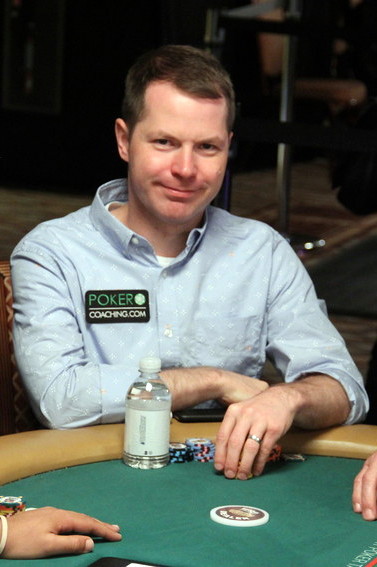






Finding A Good Spot To Call Downby Jonathan Little | Published: Jan 12, 2022 |
|
|
 In a recent $10,000 buy-in World Series of Poker event, I arrived on time to find just four other players at my table.
In a recent $10,000 buy-in World Series of Poker event, I arrived on time to find just four other players at my table.
Everyone was playing what seemed to be a somewhat tight, aggressive strategy, except for one player who was clearly trying to win every pot he entered, which happened to be most of them. Prior to the following hand, we only played a few pots together, with him winning a few small ones from me.
At 50-100 blinds, I raised to 300 out of my 60,000 stack with 9 9
9 from the cutoff. My loose, aggressive opponent called from the small blind.
from the cutoff. My loose, aggressive opponent called from the small blind.
The flop came K 6
6 2
2 , and my opponent led into me for 500.
, and my opponent led into me for 500.
I was unsure what to make out of his bet. While he likely has only one specific type of hand, such as a premium hand like a set, a decently strong hand like a six, or a draw like 4-3, it is impossible to know what he is actually doing. I decided to roughly assign him a loose range containing any pair on the board, any gutshot straight draw, and the occasional stone bluff. Notice that this assumes he does not have two pair or better often at all.
I called because my hand is in fine shape against that range. When you are somewhat sure that your opponent is trying to push you around, you cannot be afraid to call and see what develops, even when you have a hand that could easily be crushed and has only a small chance to improve.
The turn was the 8 . My opponent bet 1,500 into the 1,700 pot.
. My opponent bet 1,500 into the 1,700 pot.
At this point, I was becoming more sure that he was trying to make me fold what he perceived to be a marginal made hand. While I didn’t have much to base my read on besides his previous play, I thought that he would make a smaller bet, perhaps 1,100 or so, if he wanted me to call.
I decided to trust my read and call his turn bet. Before calling, I decided that I was not especially looking to fold if he bet on most rivers. If you pay close attention to your opponent, you will occasionally find spots where you are as confident as reasonably possible that he is bluffing. I felt like this was one of those situations.
The river was the 4 . My opponent bet 3,500 into the 4,700 pot.
. My opponent bet 3,500 into the 4,700 pot.
While his river bet was not quite as large in relation to the size of the pot as his turn bet, I decided to stick with my read that he was bluffing a large amount of the time. If he made an even larger bet, I would have been even more inclined to call. If he made a small bet, perhaps 2,000 or so, I would have been much more concerned that he was trying to get me to call with most of my range, which would likely mean that he was betting for value.
I called fairly quickly and was pleasantly surprised to see my opponent’s cards quickly hit the muck, awarding me a sizable pot early in the tournament.
It is important to realize that early in a tournament, there isn’t much of a difference between a 540-big blind stack and a 660-big blind stack. Whether I won or lost this hand, my opponent would get the message that I am not someone he can blindly push around. Ideally, this will result in him playing a somewhat straightforward strategy against me for the rest of the day.
Sure enough, in this event, my opponent stayed completely in line against me for the remainder of the day, allowing me to get away with whatever I wanted. Especially when the chips you risk are not worth too much, do not be afraid to get a bit out of line if you think the result will be that your opponents allow you make easier decisions later in the day once the blinds go up. ♠
 Jonathan Little is a two-time WPT champion with more than $7 million in live tournament earnings, best-selling author of 15 educational poker books, and 2019 GPI Poker Personality of the Year. If you want to increase your poker skills and learn to crush the games, check out his training site at PokerCoaching.com/cardplayer.
Jonathan Little is a two-time WPT champion with more than $7 million in live tournament earnings, best-selling author of 15 educational poker books, and 2019 GPI Poker Personality of the Year. If you want to increase your poker skills and learn to crush the games, check out his training site at PokerCoaching.com/cardplayer.
Features
Tournaments
Strategy
Commentary & Analysis